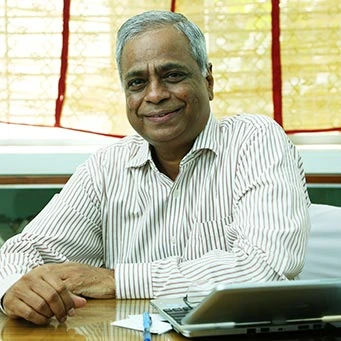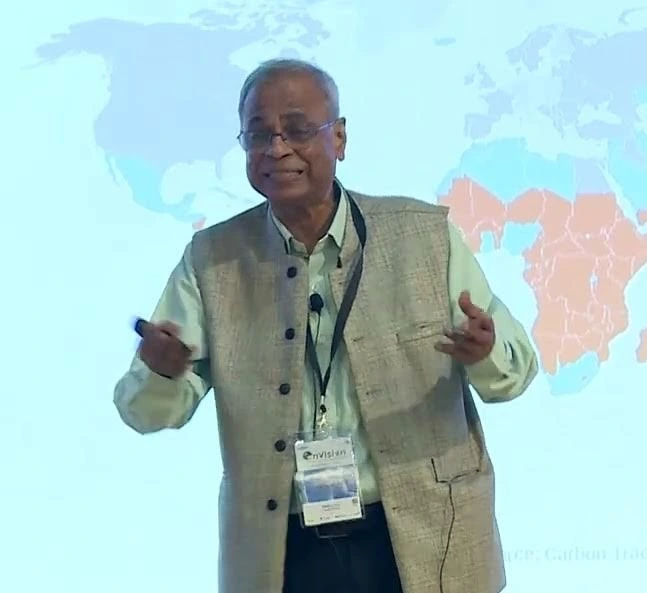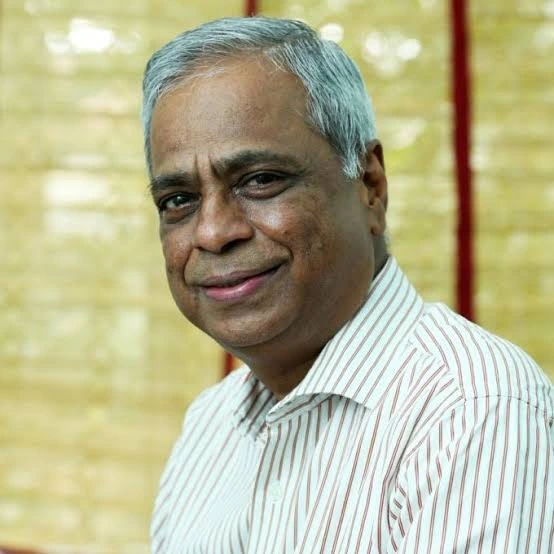(Jun 5, 2025) From a quiet homecoming in 1981 to building India’s first university-based research park, Dr. Ashok Jhunjhunwala transformed how research meets reality. The Padma Shree awardee has left his mark across diverse domains, from wireless telephony and mobile banking to solar technology and battery swapping for electric vehicles. Yet, his most enduring legacy remains the IITM Research Park, a visionary institution he helped conceive and build, where he continues to champion the next wave of deep-tech innovation that drives livelihoods, startups, and national missions.
Born in Kolkata in 1953 to a Gandhian family, Jhunjhunwala grew up immersed in ideals of public service and equity. He earned his B.Tech. in Electrical Engineering from IIT Kanpur before pursuing an MS and PhD at The University of Maine, USA. After a short teaching stint at Washington State University (1979–80), he made a deliberate choice to return to India. On his birthday, June 22, 1981, he joined IIT Madras as a professor of electrical engineering, beginning a four-decade journey that would reshape India’s innovation landscape.
Over the years, Professor Jhunjhunwala emerged as a leading bridge between academia and industry. While his pioneering work in wireless communication earned him the Padma Shri, his influence has transcended technology. Through visionary leadership, he mentored generations of innovators, built institutional frameworks for industry collaboration, and founded the IITM Research Park, India’s most celebrated innovation ecosystem that has incubated startups collectively valued at more than ₹45,000 crore.

Apart from being honoured with the Padma Shri in 2002, Dr. Jhunjhunwala has earned the Shanti-Swarup Bhatnagar Award, Vikram Sarabhai Research Award, H. K. Firodia Award, Silicon India Leadership Award, Millenium Medal at Indian Science Congress and many other awards and accolades.
IITM Research Park: Powering India’s innovation revolution
When Dr. Ashok Jhunjhunwala joined IIT Madras in 1981, he noticed a glaring disconnect. Academia and industry rarely collaborated. Indian companies leaned heavily on imported technologies, making products costly and often inaccessible to the masses. Jhunjhunwala saw an opportunity to change that. His vision was clear that if innovation was to serve India, it had to be locally developed, affordable, and scalable.
That conviction laid the foundation for the IITM Research Park, a transformative experiment in bridging the gap between research and industry. Strategically located next to the IIT Madras campus, the Park was built on the belief that academia and industry must co-create, not operate in silos.
Research park is proof that the status quo can change when you bring together the wide knowledge of academics, the ability of industry to turn science into products and the irrepressible energy of our youth.
Dr Ashok Jhunjhunwala
Where ideas become impact
Today, the 1.2 million sq. ft. IITM Research Park is a thriving ecosystem where startups, corporate R&D teams, and IITM faculty work side by side. It’s a space where lab experiments evolve into real-world solutions, where students see their ideas reach markets, and where entrepreneurs and professors often share the same whiteboard.
The Park is not just an incubator. It’s an engine of transformation that has launched dozens of deep-tech startups, accelerated affordable technology prototypes, and mentored a generation of mission-driven entrepreneurs. More importantly, it has shattered the myth that India must import innovation. Here, industrialization is homegrown and globally competitive.
Prime Minister Narendra Modi has spoken about the IIT Madras Research Park. During the 56th convocation of IIT Madras on September 30, 2019, and remarked:
I visited the research park established on campus. This is the first such effort in the country. I saw an extremely vibrant start-up ecosystem today. I was told that so far, about 200 start-ups have been incubated here. It was my good fortune to see some of them. I saw efforts in electric mobility, Internet of Things, healthcare, Artificial Intelligence, and more.
A scalable model for the nation
Structured as an independent Section 8 company, the Park retained autonomy while harnessing IIT Madras’ academic prowess. Since its first phase launched in 2010, it has rapidly expanded. Now home to over 200 labs, more than 70 R&D partners across 17 sectors, and the birthplace of 1,300+ patents and more than 200 startups incubated across 13 sectors, Its influence has rippled across India. IITMRP has become a model for research parks at other premier institutions and has shaped national innovation policy.
At the helm, Dr. Jhunjhunwala continues to serve as President, steering it as one of India’s most celebrated innovation hubs, a living example of how visionary leadership can turn a campus into a countrywide catalyst.
Learning from the ground up
Despite his stellar academic pedigree, Jhunjhunwala has been candid about his early limitations at IIT Madras. He was one of the youngest professors when he joined the institution in 1981. Instead of retreating, he immersed himself in hands-on learning, often collaborating with undergraduate students and even sharing meals with them in their hostels.
His earliest technological experiments such as building a micro-mouse with students to solve a maze were more than academic exercises. They laid the foundation for his belief in collaborative, ground-up innovation. “I actually learned technology from my students,” he mentioned in one of his speeches highlighting his philosophy of mutual learning.
Telecom for the masses
In the mid-90s, Jhunjhunwala’s efforts in developing indigenous wireless communication bore fruit with the creation of corDECT, a Wireless Local Loop (WLL) system. This system integrated both voice and Internet services and drastically reduced the cost of deploying telecom networks. At a time when setting up a landline cost ₹40,000 and monthly bills needed to be ₹1,200 just to break even, corDECT enabled telecommunication services at a fraction of the cost.
This democratization of technology wasn’t just technical but also deeply personal. “Why can’t people in India get a telephone?” he asked, recalling how even calling his parents in Kolkata was once a near-impossible task.
He also played a key role in establishing the Centre for Excellence in Wireless Technology (CEWiT) and the Telecom Standards Development Society of India (TSDSI), enabling India to start exporting IPR in telecom technology.
Powering villages and electric dreams
Since 2016, Jhunjhunwala has spearheaded efforts to drive electric vehicle (EV) adoption in India. Mentoring several startups, he has promoted innovations such as compact battery systems, battery swapping mechanisms, and eco-friendly recycling of spent Li-ion batteries. These technologies aim to make EVs more affordable and reduce India’s dependence on oil imports.
Parallel to his EV work, he also focused on solving India’s rural power issues. Starting around 2010, he championed solar rooftop systems with DC power lines in homes. These systems, paired with energy-efficient DC appliances, significantly lowered energy losses and offered a practical solution to India’s power distribution challenges.

In the 2010s, Jhunjhunwala turned his attention to India’s power woes. He pioneered decentralized solar solutions by designing solar-DC systems for homes, paired with low-energy appliances and battery innovations. This approach reduced power losses dramatically and brought electricity to villages that the grid could not reliably serve.
There is no option but to go for simultaneous rapid growth in rural India. That is our biggest mission.
Dr Ashok Jhunjhunwala
A culture of risk and resilience
Throughout his career, Jhunjhunwala has championed a culture of experimentation, even at the cost of failure. His first industrial collaboration, with WS Industries, yielded a prototype that was innovative but not yet fully manufacturable. Yet it proved that indigenous solutions could work, sparking confidence across the board. The company made substantial profits, a generation of students gained hands-on experience, and Jhunjhunwala himself discovered the power of institutional engagement.
He noted, “The country gained, the students became confident. I also became confident.”
His ventures into ATMs, telecom networks, solar systems, and EVs often saw institutional resistance and commercial hurdles, but they pushed industry standards forward and forced global giants to drop their prices.

Mentorship and learning
As a teacher and mentor, Jhunjhunwala has influenced generations. He believes the best learning comes from students and peers. “One of the best things I found is to learn from your students and your youngsters,” he said.
From helping a drug-addicted student rehabilitate, graduate, and become a professor in the U.S., to sitting with his own mentees into the night deciphering circuit logic, his mentorship is both personal and transformative.
Legacy and the road ahead
Today, Dr. Ashok Jhunjhunwala remains an active mentor, teacher, and policy advisor. Even as he contemplates stepping down from his day-to-day responsibilities at IITM Research Park, he is not retiring. “I will continue to be a mentor. I’ll continue to teach and inspire youngsters,” he said.
He is especially focused on nurturing Tier 2, 3, and 4 engineering talent. “What these youngsters can do if they are a little bit inspired!”,” he exclaimed.” “This is what India is about.”
Jhunjhunwala’s journey is a great example of what happens when an academic stops asking, “But what can I do?” and starts building bridges between ideas and execution, classrooms and companies, and ultimately, India and its aspirations.
- Follow Dr. Ashok Jhunjhunwala on LinkedIn
ALSO READ: US’ National Medal winner Dr Ashok Gadgil merges engineering and empathy to transform communities



